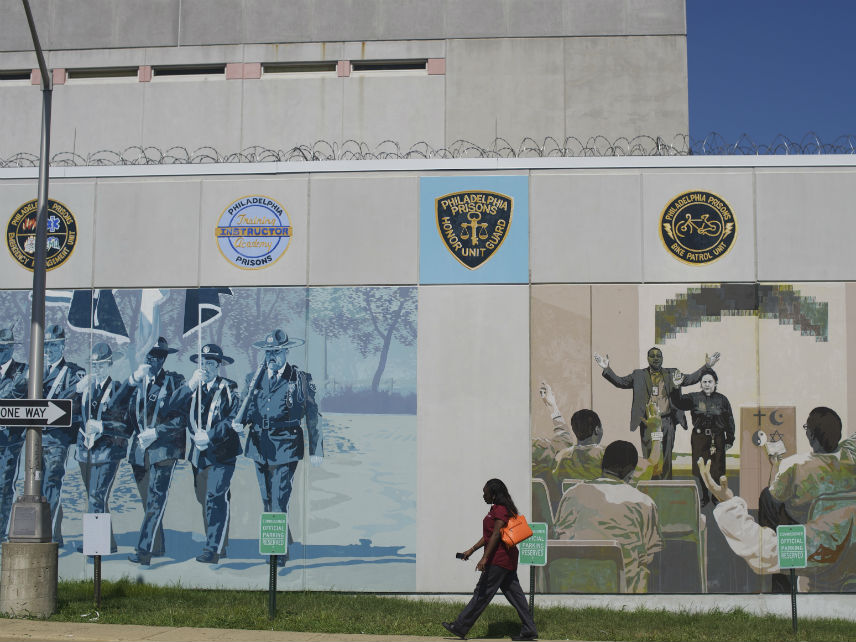ACLU Sues Pennsylvania For Putting Death Row Inmates in Permanent Solitary Confinement
"This is a profoundly damaging practice. It destroys people."

Five inmates on Pennsylvania's death row have spent a cumulative 115 years in solitary confinement—more than 42,000 days with little to no human contact in a cell the size of a parking space.
Such extreme and prolonged deprivation violates their constitutional rights against cruel and unusual punishment, according to a new lawsuit filed today on their behalf, as well as 151 Pennsylvania death row inmates, by the American Civil Liberties Union and the Abolitionist Law Center.
"Defendants' years of infliction of mental and physical harm on Plaintiffs and the Class Members strips them of their dignity and worth, transgresses civilized society's notions of decency, and constitutes a practice that is disavowed in modern society," the lawsuit says.
Pennsylvania automatically places death row inmates in solitary confinement, regardless of their behavior, and they stay in those 8-by-12-foot concrete cells 22 hours a day, every day, until they're executed or their sentence is overturned.
Because of the rarity of actual executions in Pennsylvania—the last one occurred in 1999, and there have only been three total since the death penalty was reinstated by the Supreme Court in 1976—this effectively means death row inmates are condemned to decades of mind-scrambling isolation. Eighty percent of the state's death row inmates have been in solitary for more than 10 years, according to the lawsuit. One plaintiff in the lawsuit has spent 27 years in solitary.
"This is a profoundly damaging practice that exacerbates mental illness, creates mental illness in previously healthy people, causes and aggravates a whole range of physical illnesses, and it destroys people," says David Fathi, Director of the ACLU National Prison Project.
One of the most pernicious effects of prolonged isolation, Fathi says, is what social psychologist Craig Haney, a who studied inmates at the "secure housing unit" in California's infamous Pelican Bay State Prison, calls "social death."
"You forget how to interact with other humans," Fathi says. "You've just forgotten how to be a person, really."
Beyond that, there's also the fiscal argument. Holding an inmate in a supermax cell costs two- to three-times as much as keeping them in the general prison population, Fathi says.
The Supreme Court recognized as early as 1890 that solitary confinement has a devastating effect on inmates, but courts have traditionally given wide deference to prison managers when it comes to security.
However, the lawsuit argues the Pennsylvania Department of Corrections' policy serves no penological purpose, and Fathi says courts have become more receptive in recent years to claims that solitary confinement is unique from regular prison practices.
In 2005, the Supreme Court ruled that the due process clause of the Fourteenth Amendment required inmates be afforded procedural protections from being sent to supermax confinement.
In 2015, Supreme Court Justice Anthony Kennedy wrote in a concurrence that "research still confirms what this Court suggested over a century ago: Years on end of near-total isolation exact a terrible price."
Both the federal government and states have been slowly rolling back their use of solitary confinement. In recent years, both the Association of State Correctional Administrators (ASCA) and the American Correctional Association released new guidelines and standards limiting the use of solitary confinement. The Obama administration also banned the use of solitary confinement for juveniles in the federal prison system and limited the amount of time adults can spend in solitary.
While the use of solitary confinement in the U.S. has been dwindling in recent years, there were at least 67,442 inmates in the U.S. locked in their cells for 22 or more hours a day in the fall of 2015, according to a report last year by the ASCA and Yale Law School.
The practice of solitary confinment was in fact invented in Pennsyvania. When Charles Dickens visited Pennsylvania's Eastern State Penitentiary in 1842, where the use of what we now call solitary confinement was pioneered, he recoiled in horror.
"I hold this slow and daily tampering with the mysteries of the brain to be immeasurably worse than any torture of the body," he wrote, "and because its ghastly signs and tokens are not so palpable to the eye and sense of touch as scars upon the flesh; because its wounds are not upon the surface, and it extorts few cries that human ears can hear; therefore the more I denounce it, as a secret punishment which slumbering humanity is not roused up to stay."
But because of a growing number of lawsuits and prison reforms, the secret punishment is now out in the open.


Show Comments (16)